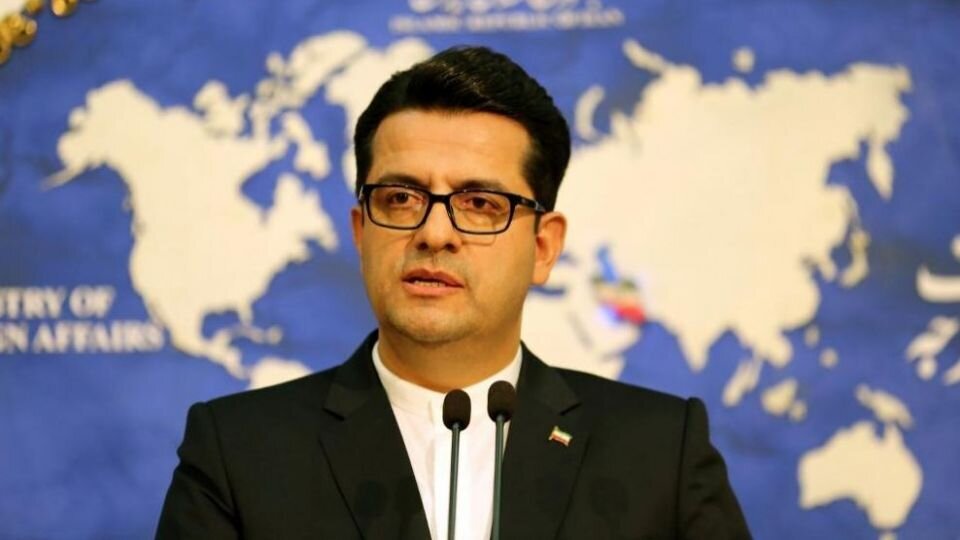Iran urges U.S. to end unilateralism

TEHRAN - Foreign Ministry spokesman Abbas Mousavi has urged the United States to end its “abject unilateralism”.
“JCPOA is neither the first nor the last of the multilateral achievements Trump withdrew from. The US regime has sought to secure its short-term interests at the cost of nations’ long-term prosperity. The regime must END its abject unilateralism,” he tweeted on Friday.
President Donald Trump officially withdrew the United States from the 2015 nuclear agreement, officially called the Joint Comprehensive Plan of Action or JCPOA, in May 2018.
However, U.S. Secretary of State Mike Pompeo is preparing an argument that the U.S. remains a participant in the Iran nuclear accord. That claim comes even as Trump clearly stated in May 2018 he was “terminating the United States’ participation” in the JCPOA.
Pompeo’s move is part of an intricate strategy to pressure the United Nations Security Council to extend arms embargo on Tehran or see far more stringent sanctions reimposed on the country.
Diplomats and analysts say it is absurd that the United States claims it is still a participant to the JCPOA.
Seyed Yaser Ziaee, an international law professor, told the Tehran Times on Tuesday that “it is impossible for the U.S. to invoke the snapback mechanism because a country that is no longer a member of a treaty and has withdrawn from it, cannot refer to dispute mechanisms within it.”
President Hassan Rouhani warned on Wednesday that Iran “will never accept” violation of the UN Security Council Resolution 2231 that endorsed the 2015 nuclear deal.
“It is the absolute right of Iran to be removed from the arms embargo (list) within the framework of the 2231 resolution,” Rouhani told a cabinet meeting.
Under Resolution 2231, an arms embargo against Iran will expire on October 18.
In a tweet on May 5, Pompeo said, "What the American people should know is President Donald Trump is committed to using every tool we have to prevent the Iranians from getting more conventional arms. I am convinced that we have the capacity to do that."
In his interview with Fox New, Pompeo reiterated, "We’re working with our British, our French partners, our friends, saying you all know this doesn’t make sense either. I think they agree with us on that. We hope the Russians and the Chinese will see it that way, too. But make no mistake about it; we’re going to use every tool we can in our diplomatic capability to ensure that that prohibition on arms sales to Iran doesn’t expire in just a handful of months."
Moscow has repeatedly noted that it will oppose the extension of the arms embargo on Tehran, and Beijing isn’t likely to go along with Washington's proposal either. China and Russia have veto power on the UN Security Council.
Rouhani said, “If we build a weapon or purchase it, it will be for defending the people. Our weapon is not fuel on fire, it is water on fire and we will not start a war.”
“The United States must know what it argues about arms embargo is an inseparable part of the JCPOA. Our response to extension of arms embargo will be the same that I wrote to leaders of the 4+1 group. I wrote to them in the last paragraph that if they make a mistake, it will be a historic defeat for them,” the president pointed out.
5+1 group has been renamed 4+1 as the U.S. is no longer a party to the multilateral deal.
Rouhani added, “A return of arms embargo on Iran under any name … or mechanism will lead to dire consequences.”
Rouhani also said that the U.S. knows its withdrawal from the JCPOA was a mistake.
Foreign Minister Mohammad Javad Zarif said on Tuesday that Pompeo pretends that Resolution 2231 is independent from the nuclear deal, reminding him that the JCPOA is “PART of 2231” and advised Pompeo to read it.
“JCPOA is PART of 2231. That’s why it's 104 pages—& why he’s not read it.
2231 for Dummies:
-It would NOT EXIST w/o JCPOA
-US violated it & prevented others from complying
-US has NO standing,” Zarif tweeted.
Also in a tweet in late April, Zarif advised the U.S. secretary of state to “stop dreaming”, saying the Iranians always decide their destiny.
“2 yrs ago, @SecPompeo and his boss declared ‘CEASING US participation’ in JCPOA, dreaming that their ‘max pressure’ would bring Iran to its knees. Given that policy’s abject failure, he now wants to be a JCPOA participant. Stop dreaming: the Iranian Nation always decides its destiny,” Zarif stated.
Esmaeil Baghaei Hamaneh, Tehran’s ambassador and permanent representative to the UN office in Geneva, has said that the United States must bear responsibility for abusing the UN Security Council and manipulation of its decisions.
“US must be held to account and bear responsibility, not to be APPEASEMBOLDENED, for its bullying behavior and recurring pattern of wrongful (ab)use of the #UNSC & manipulation of its decisions,” Hamaneh tweeted on May 3.
In another tweet, he said, “US’ invocation of #UNSCR2231 is a travesty, flouting a fundamental principle governing intl relations;’...a party which disowns or doesn't fulfill its own obligations cannot be recognized as retaining the rights which it claims to derive from the relationship’ (#ICJ, 1971).”
EU foreign policy chief Josep Borrell has said that the United States can no longer be considered as a participating member of the nuclear accord.
“It’s clear that in the statement by President Trump and the U.S. presidential memorandum of last May (May 218), they announced that he was ending his participation in JCPOA,” he said in an exclusive interview with RFE/RL on April 30.
“And I also want to recall that the U.S. has not participated in any meetings of activities within the framework of this agreement since then. So it’s quite clear for us that the U.S. are no longer a participating member in this agreement,” Borrell added.
NA/PA
Leave a Comment